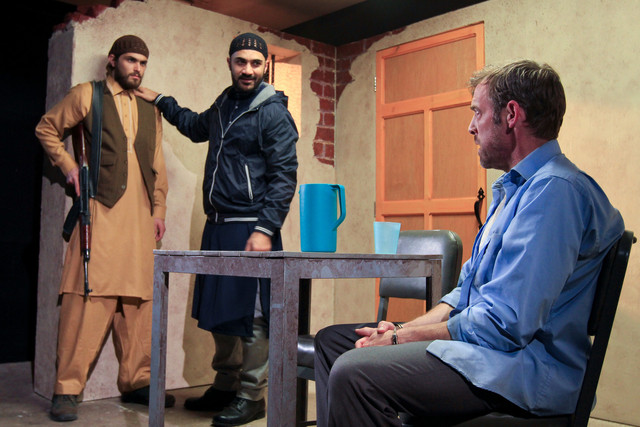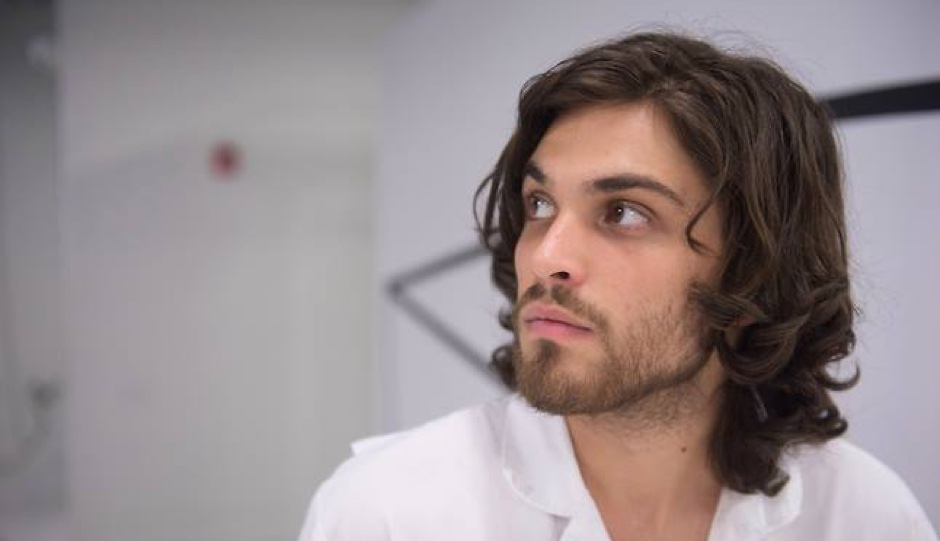Theatre Exile’s production of THE INVISIBLE HAND features an all-star creative team, including director Matt Pfieffer and actors Ian Peakes as Nick Bright, Maboud Ebrahimzadeh as Bashir, and Anthony Mustafa Adair as Dar. Henrik Eger conducted interviews with all four. In this interview, we hear Anthony Mustafa Adair’s thoughts on this provocative new work. [Studio X, 1340 S. 13th Street] May 12-June 5, 2016; theatreexile.org.

Henrik Eger: What was your first response reading the script of The Invisible Hand?
Anthony Mustafa Adair: I felt a little like Nick [Bright, the American hostage] does at the end of the play. Paralyzed. Many great plays don’t make for a good reading experience—they are meant to be seen. However, this play was arresting even on the page alone.
Henrik: What did you bring to this challenging play as an actor?
Anthony: Dar was a lot of work for me. I’ve played other characters who had more stage time and more to say, but playing with a language impediment and a thick accent and even a bit in Punjabi: it was so many balls to juggle at the same time while still trying to maintain being an honest human being on stage. We had excellent help: dialect coach, Mel [Melanie Julian]. She helped me use training I received at UArts [Philadelphia’s University of the Arts] to build Dar’s voice.
Henrik: Going into the rehearsal process, what were the toughest parts for you?
Anthony: I think this play is pretty dark, and in order to keep ourselves sane, we ended up joking around a lot more than you might expect. We obviously got the job done, but we were allowed to be ourselves to trust each other enough to confront the weight of the play from a playful place. I also think this ended up helping our ensemble grow.
Henrik: What did you bring to a play in which cultures, economies, religions, worldviews, and personalities clash in terms of your own cultural, economic, religious, ideological, and/or behavioral background?
Anthony: Well personally, I’m a Libertarian, much to the chagrin of all my very liberal friends. This means I’m socially liberal but fiscally conservative, so I do in fact believe, like Nick Bright, in the power of the Invisible Hand. Whereas most of my community is heavily Democrat, I find myself caught in a tension between my own beliefs and those around me—who usually presume that I share their opinions. We often have debates and I’m usually outnumbered, but I still enjoy it. I think divergent thinking always leads to more understanding. You don’t learn that much from people who think all the things that you think. The people you learn from most are the ones who’ve challenged your views, forcing you to really think about why you believe the things you do—which is why this play resonates

Henrik: Looking back, what are some of the most rewarding parts of the play for you now?
Anthony: The people who’ve seen the show have been very complimentary and I think this play’s content is not your typical dramatic experience—so It was hard to tell exactly what people were going to think. I think the audible gasps and “oh my God” [utterances] that happen in the audience during the show are very rewarding.
Henrik: What surprised you about the play and/or your own evolution during the rehearsal process and the performances?
Anthony: This play requires a lot of heart. It may not seem like it, but I think it would be very easy to do this play and have the audience not like anyone at the end of the play. Our production has a lot of heart. I think we did a good job with legitimizing everyone’s point of view and letting the audience empathize with all of us—not just Nick.
Henrik: Do you have a sense that audiences relate to the complexity of this play, or do you have a sense that some folks might label you as either one-dimensional terrorists and the US hostage as the only real human being in the play?
Anthony: I think the people who come to see the theater are already inclined to be skeptical of America’s intentions in foreign meddling. So I do think those that have come to see it have really followed along and based on our talk-backs, the questions have been complex, so this gives me hope. But it would be interesting to see if this play had a really wide demographic audience—who’s to say what the afterthoughts would be.
[Studio X, 1340 S. 13th Street] May 12-June 5, 2016; theatreexile.org.
